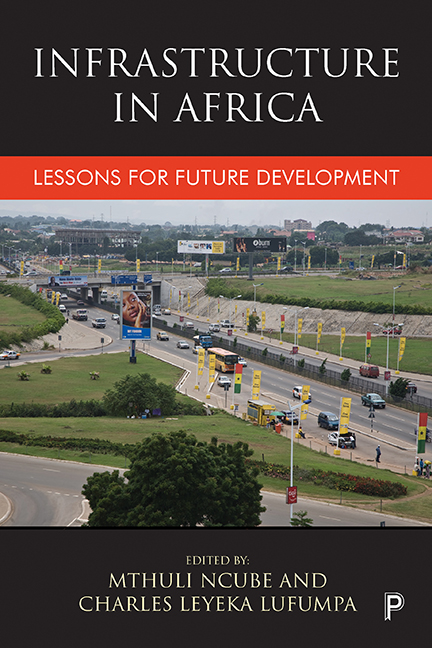Book contents
- Frontmatter
- Contents
- List of figures
- List of tables
- List of boxes
- Notes on contributors
- Acknowledgements
- Foreword
- Introduction: Infrastructure in African development
- Part 1 Spatial and demographic contexts
- Part 2 Sector-specific issues
- Part 3 Regional issues
- Part 4 Financing issues
- Part 5 Concluding remarks
- Index
fourteen - Infrastructure deficit and financing needs in Africa
Published online by Cambridge University Press: 05 April 2022
- Frontmatter
- Contents
- List of figures
- List of tables
- List of boxes
- Notes on contributors
- Acknowledgements
- Foreword
- Introduction: Infrastructure in African development
- Part 1 Spatial and demographic contexts
- Part 2 Sector-specific issues
- Part 3 Regional issues
- Part 4 Financing issues
- Part 5 Concluding remarks
- Index
Summary
Introduction
Infrastructure development contributes to economic activity by lowering the costs of doing business, improving the competitiveness of local production, and facilitating trade and foreign direct investment. Firms with reliable power supply are able to produce more. Those with access to a world-class highway network can reach their customers faster and cheaper, while those with easy port access are able to source their inputs and export their finished products at a lower cost. Construction of infrastructure has the added benefit of directly contributing to economic output. Hence, in addition to being a factor of production that influences a firm's production and location decisions, infrastructure contributes to the development of both upstream and downstream industries as well as financial markets.
This positive relationship is supported empirically. African countries with the most advanced manufacturing export industries, such as South Africa and Mauritius, have benefited from world-class infrastructure to support their industries. Several studies find a positive correlation between foreign direct investment in Africa (other than investments in extractive industries) and a critical mass of favorable factors, including good-quality infrastructure in particular. Both volume and quality of infrastructure also appear to be positively correlated with marginal productivity of capital and with private sector investments. With adequate infrastructure, African firms could achieve productivity gains of up to 40%. And bringing Africa's infrastructure stock to the level of that for Mauritius could enhance Africa's gross domestic product (GDP) growth by as much as 2.2% per year.
This chapter examines the access to sources of local market finance for infrastructure development in Africa. The first section examines the state of infrastructure access in the continent. The second section presents a snapshot view of the constraints to infrastructure development in Africa. The third section discusses innovative local sources of infrastructure finance in the continent while the fourth examines some of the constraints and solutions to a major source that the African Development Bank (AfDB) has emphasized lately— infrastructure bond. The final section concludes with a discussion of the role of the AfDB.
State of infrastructure access in Africa
Africa suffers from a critical shortage of infrastructure. Its infrastructure coverage lags behind that of other developing countries, particularly regarding access to electricity, transport networks, water and sanitation, irrigation, and information and communications technology (ICT) (Figure 14.1).
- Type
- Chapter
- Information
- Infrastructure in AfricaLessons for Future Development, pp. 583 - 614Publisher: Bristol University PressPrint publication year: 2017



